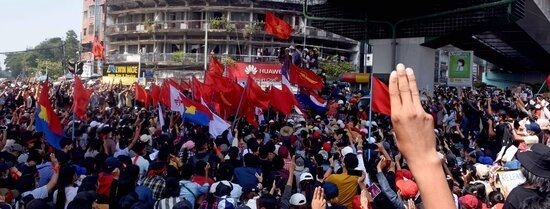Dr Gerard McCarthy joined the International Institute of Social Studies (ISS) in January 2023 as Assistant Professor of Social Policy and Development. A month later, he released his first solo-authored book, Outsourcing the Polity: Non-State Welfare, Inequality and Resistance in Myanmar, which is available for purchase through Cornell University Press. In this Professor Portraits interview, we introduce you to one of ISS’ newest faculty members as he reflects on his latest book and research journey.
McCarthy is originally a Sydney native who earned his PhD at the Australian National University in the city of Canberra focusing on redistributive politics in Myanmar. Later, he would expand his academic horizons to Southeast Asia more broadly as a Research Fellow at the Asia Research Institute, part of the National University of Singapore.
McCarthy’s scholarship explores the politics of welfare regime change and redistribution, particularly regarding development and inequality in Southeast Asia. His new book, Outsourcing the Polity, brings together years of research to offer a fresh account of social outsourcing in post-independence Myanmar. In it, McCarthy demonstrates how market reform in the 1990s and 2000s forced private and non-state actors to take the burden of providing social welfare.

Bravo on your first solo-authored book! What is it about?
‘Thank you! My book uncovers the origins, mechanisms and long-term legacies of what I term ‘social outsourcing’: the process whereby government officials shift responsibility for social aid and public goods to non-state actors. For instance charities, certain communities or philanthropists. Often this is done in exchange for commercial licenses and tax concessions, which has structural and long-term impacts on the social capacity of the state.’
You focus on the social provisioning roles taken up by non-state actors in the context of autocratic market reform in Myanmar over the last few decades. How have things evolved in Myanmar since the military coup in 2021 concerning the welfare sector?
‘It is little known, but even before the coup Myanmar had one of the world’s most vibrant non-state welfare sectors! Thousands of organizations have helped to plug social provisioning gaps in every village and neighbourhood across the country, often at state encouraged, since the early 1990s. With the return to military rule in 2021 these groups have only become more critical to social provisioning. They are now at the heart of social governance in much of the country - running schools, coordinating and delivering medical treatment and sustaining widespread resistance efforts against the junta.’
What was the research journey like for you while authoring this book?
‘Researching and writing this book was one of the most interesting and challenging experiences of my life. The most incredible part was conducting almost two years of fieldwork in provincial Myanmar, immersed in the charity, political and business networks that are at the heart of the book. The hardest thing is that the lives of so many of my closest interlocutors in Myanmar have been upheaved by the military coup in February 2021 – with many now at the vanguard of the struggle for democracy.’
Watch Dr McCarthy in this video


You argue that there are costs to outsourcing social welfare; it can undermine long-term social development. Can you tell us about your thoughts on this?
‘Social outsourcing can completely distort distributive politics, entrench inequality and undermine development for decades. Many charities and local welfare groups in Myanmar and beyond deliver some form of public good and aid to the needy. Yet, the assistance provided is often very patchy. For instance, charity groups mostly provide one-off emergency support to people of the same religion or ethnicity after a disaster. This is not always due to prejudice but also because they don’t know anyone from that minority community or the regions where they reside are not easily geographically accessible. The outcome though is that minorities and remote communities often get either passively or deliberately mapped out of the imagination of mutuality on which non-state aid relies – creating exclusionary hierarchies of belonging and citizenship.’
‘In a context like Myanmar, where the state collects very little tax revenue, the lack of state social capacity is a big structural problem! By drawing out some of these connections, I hope that the book can open new ways of thinking about redistributive politics in low-resource contexts and especially in Myanmar once the country moves towards more democratic rule.’
What are key recommendations that people can take away from this book?
‘International partners need to do a much better job in engaging with local social welfare actors in Myanmar. The junta admits that it is no longer in control of large parts of the country, especially rural lowland regions which had no recent history of anti-state resistance until 2021 but where social outsourcing has been going on for decades. In these areas non-state welfare actors are now leading social governance as well as resistance to the dictatorship. Regional and international actors need to properly resource and support these groups to address the dire humanitarian and political situation in the country.’
‘At the same time, people fighting for a more fair and inclusive society in Myanmar and beyond must also begin to plan and enact alternatives to social outsourcing. Activists and policymakers who care about sustainable and inclusive development have the difficult task of showing that thoughtfully designed state social initiatives can achieve justice, equity and national reconciliation far more effectively than the patchwork non-state social solutions of recent decades.’
Thank you very much for this interview!
- Assistant professor
- Related content

